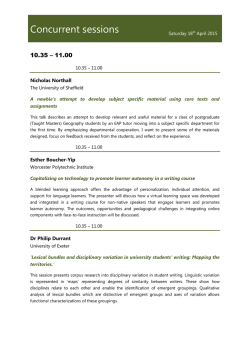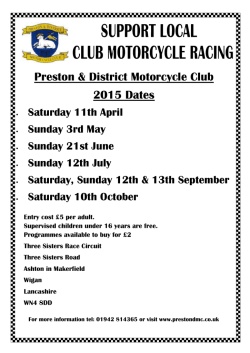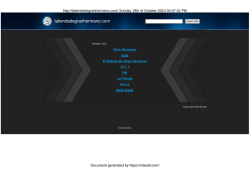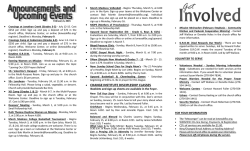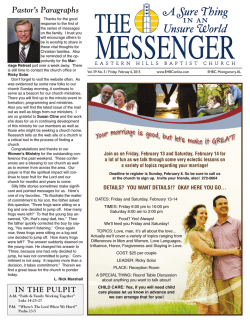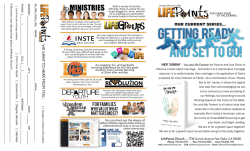
Concurrent sessions - BALEAP Conference 2015
Concurrent sessions Sunday 19th April 2015 09.30 – 09.55 09.30 – 09.55 Pete Sharma Pete Sharma Associates Using a Vocabulary Organizer in EAP courses 2014 saw the launch of a ground-breaking system for EAP students to record their new words: the Vocabulary Organizer (Collins). Students decide whether to record new lexis for productive or receptive purposes. How does this work in practice? This presentation summarises the feedback from five pilot pre-sessional groups at Warwick University. The results have interesting implications for learner training. Leave it blank 09.30 – 09.55 Professor Diane Pecorari*, Professor Philip Shaw, Dr Hans Malmström Linnaeus University (Professor Pecorari) Stockholm University (Professor Shaw) Chalmers University of Technology (Dr Malmström) Academic vocabulary size as a predictor of academic success This paper reports on a new test of academic vocabulary based on the Gardner and Davies (2013) academic vocabulary list. Undergraduates and postgraduates from several disciplines were tested. Scores were correlated with final grades for the academic term in which they were tested. Results indicate that the predictive value of this test is greater for some groups than others Leave it blank 09.30 – 09.55 Dina Awad University of Leicester Cognitive Theory and Task-based Competence The presentation reports the findings of a practice-based research investigating cognitive elements in production by examining accuracy and error rates in L2 article use. Results indicate that the performance of one proficiency-level group varied significantly across three tasks because of different knowledge types and processing demands. Concurrent sessions Leave it blank Sunday 19th April 2015 09.30 – 09.55 Anne Kavanagh University of Nottingham Exploring Arabic speakers’ perceptions of EAP reading: Cross-linguistic effects on processing and strategy use Characteristically heavy reading loads in higher education often prove challenging for Arabic-L1 students. Based on an exploratory study of six students’ experiences of reading Arabic and English texts, I focus specifically on reported perceptions of text difficulty and strategy use, and real-time interactions with English texts during in-depth interviews. Cross-linguistic interference is manifested in over-reliance on context, and ‘vowel-blindness’. Leave it blank 09.30 – 09.55 Martin Herles & Ruth Trinder Vienna University of Economics and Business Style Guides for Academic Writing: A (or a?) Critical Discussion Students, teachers and academics alike are exposed to style guides on numerous levels, from commercial guides for undergraduates to the Chicago Manual of Style, giving manifold and sometimes even contradictory advice. Analysing a broad sample of guides, and focusing on selected key issues, this talk tries to assist in making more sense as well as better use of these guidelines. Leave it blank 09.30 – 09.55 Dr. Qian Zhang University of Bedfordshire EUP for WP: feedback on an English for University Purposes programme designed to enhance the 1st year ‘widening participation’ students experience It reflects on the design, delivery and evaluation of the English for Academic Purposes (EUP) programme that provided 1st year WP students with an opportunity to practice and build on their academic literacies. It has recognised that EAP programme can benefit all university students, not just international students in the future. Concurrent sessions Sunday 19th April 2015 09.30 – 10.30 (Workshop) Leave it blank 09.30 – 10.30 Tony Prince University of East Anglia Campus Delivering EAP teacher development online: keeping the tutor present This workshop introduces the TEAP Online course delivered by the Norwich Institute for Language Education (NILE), exploring its design, digitisation and development. It looks at student feedback and tutor experience of developing skills in EAP at a distance. It gives participants an overview of design principles, development practicalities and delivery realities, offering hands on experience of the relevant materials. 10.05 – 10.30 Leave it blank 10.05 – 10.30 Dr Chris Lima University of Leicester Using Blackboard to promote the development of writing skills This talk focuses on how Virtual Learning Environments (VLEs) can be used to promote the development of writing skills among EAP students. It will examine forms of input, interaction, and output afforded by Blackboard tools and how they can be used to help students familiarize themselves with writing practices and conventions in the area of literary studies. Leave it blank 10.05 – 10.30 Dr Maggie Charles Oxford University Language Centre After EAP courses, what next? Students’ independent use of corpora This presentation reports on students’ use of corpora one year after they took a 6-week corpus course. Five years of survey data from 144 international students show that 63% continued to consult their corpus for help with academic writing. I discuss further evidence of long-term corpus use and argue that corpora provide a valuable resource to support students’ independent learning. Concurrent sessions Leave it blank Sunday 19th April 2015 10.05 – 10.30 Dr Josephine Mirador & Maya Mitova Independent (Dr Mirador) University of Nottingham Ningbo (Mitova) As they see it! International students’ perceptions of the language skills they need to be globally competitive This paper addresses the importance of representing the perspective of international students by identifying their English language needs as they see it (i.e. in their current academic programmes and to be globally competitive in the future). The paper is based on a work-in-progress (i.e. case studies documenting the experience of international students joining UK universities or their satellite campuses). Leave it blank 10.05 – 10.30 Olwyn Alexander, Kate Hughes & Stephanie Ashby Heriot-Watt University Unknown unknowns: uncovering value-added activities for in-sessional classes from a student perspective In-sessional Academic Skills classes for postgraduate students at Heriot-Watt University were evaluated within a model of engagement (CEM model) using a combination of interviews and a BestWorst (BW) Experiment. This survey instrument results in a weighted preference ordering for identified academic skills activities. BW is relatively well-known in the disciplines of marketing and sociology but is new to EAP. Leave it blank 10.05 – 10.30 Maureen Finn The University of Manchester ‘You’ve got to tell a story’: practice-based research into genre and communities of practice in Medical and Human Sciences Using a data set of seven hours of teaching videos recorded between 2009 and 2013, this presentation will examine what qualities a small group of supervisors in the Faculty of Medical and Human Sciences (FMHS) at a Russell Group university value in academic writing, and how they present information about the content of PhD theses to their students. Concurrent sessions Leave it blank Sunday 19th April 2015 10.05 – 10.30 Magdalen Ward Goodbody University of Bath Emphasising the A and not the E in EAP: repositioning an EAP centre to face future needs and challenges This paper describes the rationale, challenges and outcomes of a major organisational change to the Bath English Language Centre (ELC). After residing comfortably for 25 years within a corner of a Modern Languages Department, the ELC has now become the University’s Academic Skills Centre, located within a Professional Service, with increased visibility, accountability and significantly enhanced offer to all students. 11.00 – 11.25 Leave it blank 11.00 – 11.25 Professor Philip Shaw, Dr Špela Mežek, Professor Diane Pecorari & Dr Hans Malmström Stockholm University (Professor Shaw and Dr Mežek) Linnaeus University (Professor Pecorari) Chalmers University of Technology (Dr Malmström) Where they’re coming from: roles for English textbooks where lectures are in foreign languages. International students may be used to textbooks in English with other activities in another language. Lecturers may accommodate to potential reading difficulties, not necessarily replicated in UK HE. A corpus of 15 Swedish-language lectures shows that awareness-raising is a persistent feature, but the main adaptation is a fairly univocal approach. This might produce expectations at odds with those of British universities. Leave it blank 11.00 – 11.25 Irina Shchemeleva National Research University Higher School of Economics, Russia The development of stance-taking strategies in L2 students’ academic essays: the case of a content-based Russian – American teleconference course The paper describes a case study of teaching academic writing into a content-based course teamtaught via teleconference to a group of Russian and American students. It shows how L2 students who Concurrent sessions Sunday 19th April 2015 have not been specially trained in English academic writing develop their ability to adopt a stance in their writing. The linguistic analysis of 3 essays given during the course (total – 45 essays) is presented. Leave it blank 11.00 – 11.25 Hilary Nesi & Sian Alsop Coventry University Teaching in a time of change: variation and commonality in ELF and English L1 engineering lectures from around the world This paper will examine differences between English-medium engineering lectures from continental Europe, the Far East, New Zealand and the UK, delivered by L1 lecturers and ELF users, and will discuss the design of materials to aid the adjustment of lecturers and students who transfer from one higher education environment to another, as part of the trend towards greater academic mobility. Leave it blank 11.00 – 11.25 Anne Heaton, Andrew Preshous & Simon Smith Coventry University Joined-up ESAP: drawing on in-sessional provision to establish a pre-sessional ESAP programme This session explores the challenges involved in incorporating an ESAP component into a presessional course that otherwise follows a mainly common-core approach. Using example materials, we will discuss how in-sessional Business modules, together with input from subject specialists, were used to inform content and delivery of the pre-sessional ESAP component. We will provide evidence of the benefits of this approach. Leave it blank 11.00 – 11.25 Ian Bruce University of Waikato Training the next generation of EAP lecturers This presentation considers the training and developmental needs of future EAP practioners, including the types of academic preparation and research involvements necessary to be positioned as academics within the mainstream of universities rather than as support service providers. In relation to developing as researchers, the paper considers issues of identity, strategic positioning and managing teaching workload. Concurrent sessions Sunday 19th April 2015 11.00 – 12.00 (Workshop) Leave it blank 11.00 – 12.00 Simon Gooch & Elaine Smith University of Nottingham Presentation Perspectives The learning and assessment of academic speaking skills within the frame of an ‘academic presentation’ can often result in limitations in terms of audience, purpose and inauthentic outcomes. We explore the structure/development of a pre-sessional module culminating in a student conference, which seems to help overcome these problems by placing academic speaking skills in a wider academic literacies context. Leave it blank 11.30 – 12.00 Julie Moore Freelance Writing Your Own: How to create effective EAP materials Despite the recent surge of published EAP materials, inevitably at some point we all need to create materials to cater to the specific needs of our students or context. In this workshop, we’ll share some key principles and practical tips to help ensure that what you create for yourself and your colleagues is as effective and professional as possible. 11.35 – 12.00 Leave it blank 11.35 – 12.00 Dave Hewish & Jane Saville The University of the West of England (UWE) “I have to depend on myself.” A response to the experiences of direct entry international students at UWE. The experiences of a small group of direct entry international students were recorded by a crossservice/faculty project group. The findings showed that improvements were required to enhance the student experience. Recommendations made at an institutional level should lead to a more collaborative and enlightened approach towards the institutional partnership strategy. A toolkit is being developed to assist faculty staff. Concurrent sessions Leave it blank Sunday 19th April 2015 11.35 – 12.00 Olga Burakov University of Lincoln From Beowulf to BALEAP: Using literary analysis strategies in an EAP classroom The paper considers the similarities between encountering literary texts in which meaning is generated in a way that might be unfamiliar to a non-expert reader and the international students’ experience of reading academic texts in English. The talk also focuses on evaluating such literary strategies as close reading, structural and figurative language analysis to consider how these might be transferred to an EAP classroom. Leave it blank 11.35 – 12.00 Steve Kirk Durham University Teaching Academic Reflective Writing: learning to weave and wave This session reports on an EAP pedagogical innovation that was used to teach MA anthropology students reflective writing. The approach draws on a theoretical tool from the sociology of education, known as semantic waves (Maton 2013). I detail the approach, applications to other forms of academic writing, and implications for teacher development. Leave it blank 11.35 – 12.00 Michael Corrigan Cambridge English Language Assessment What features of language ability should be measured for foundation and presessional course entrance decisions? The varying demands of university programmes (academic, pre-sessional or foundation) mean that, where entrance decisions are based on language test results, both the measurement of level and exam content (e.g. general vs academic) must be considered. This presentation will examine both in relation to the newly revised Cambridge English First and Advanced, which now report results on a single scale. Concurrent sessions Leave it blank Sunday 19th April 2015 11.35 – 12.00 John Morley & Dr Mary Davis University of Manchester (Mr Morley) Oxford Brookes University (Dr Davis) How can a compendium of formulaic phrases assist academic writers? Our presentation focuses on an evaluation of Academic Phrasebank (AP), a compendium of formulaic phrases, by its current users. Questionnaire data from more than 700 respondents demonstrates a wide range of usage of AP in both EAP and other teaching and writing contexts. Follow-up interview data offers insightful perspectives into the role and usefulness of AP for academic writers.
© Copyright 2026
